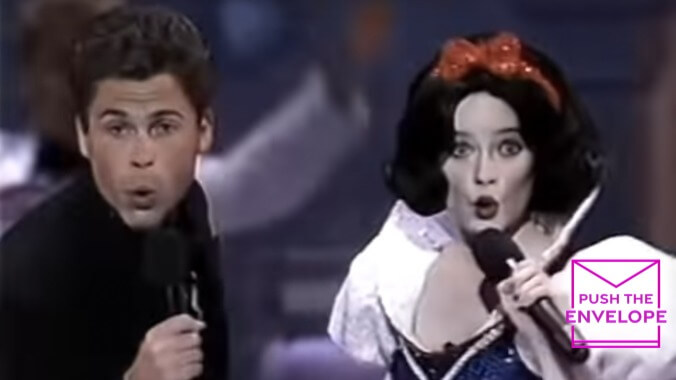Let's revisit the train wreck that was the 1989 Academy Awards

The Lowe brothers must have been really excited heading into the 1989 Academy Awards. Rob Lowe was set to open the show with none other than “the star of all time” (whatever that means), Snow White. And later on in the telecast, Chad Lowe would take to the stage with 18 (for some reason the total was 19, not 20) “stars of tomorrow” for a nine-minute musical number. Both of the performances would go on to be memorable—but for all the wrong reasons.
The 1989 Oscars were actually groundbreaking in many ways that didn’t involve cringe-inducing singing and dancing. The brainchild of Grease producer Allan Carr, the show—held on Wednesday, March 29—had a lot of firsts: the first year with no host, the first red carpet as we know it today, the first time the Best Picture nominees were each given separate presentations, and the first time “the Oscar goes to…” was standardized. But those aren’t the fun topics to cover when looking back at the most infamous Oscars show ever.
On the latest episode of The A.V. Club’s podcast Push The Envelope, our Patrick Gomez and Alex McLevy reflect on the telecast. Here is just a small excerpt of their conversation.
The opening
ALEX MCLEVY: I love a good slow-motion train wreck…. What basically Allan Carr did was…. he hadn’t made a movie in a while and he sort of saw the relatively thankless task of hosting the Oscars as a way to get back into Hollywood’s good graces. So he said, “You know, I’m going to stage this huge theatrical, song-and-dance production number. I’m going to wow everybody with a bevy of talent, and I’ll get back in Hollywood’s good graces.” So he unfortunately combined several of his favorite things. One was sort of a San Francisco camp sensibility, which is where he got the idea to have Snow White be this de facto host to open the ceremony. And so he brings in this naif—you know, this poor actress, this 22-year-old woman who just thought it’d be exciting to perform at the Oscars—gets saddled with speaking in the stilted, squeaky Snow-White voice and walking down the aisle singing about how great it is to be Snow White and being in Hollywood and looking at stars. And you just see all of Hollywood shrink and cower before her. I mean, it’s astounding to watch her shake people’s hands and have them look like they just wish the floor would open up and swallow them whole.
AM: Then we get to Rob Lowe coming out on stage, announced as Snow White’s date for the night, and the two of them proceeded to sing a cover of “Proud Mary”…
PATRICK GOMEZ: I don’t understand his rasp. I need to hear him sing other things. Did he think that that made him sound cool? Is that just his singing voice? Because it just comes out of nowhere. I have so many questions. So, so, so many questions.
AM: There’s a couple oral histories that have been done of this. It was such a disaster. And he says that afterwards he just went and sat in the green room next to Lucille Ball and they talked about whether or not this would be the end of his career.
The “Stars of Tomorrow” performance
AM: I mean, first of all, the conceit on its face is already sort of absurd, right? The “stars of tomorrow”—it’s literally just a guessing game. Here’s some people we think might be successful in Hollywood. And a few of them had already become stars in their own right.
PG: And it was written especially for the Oscars by Marvin Hamlisch, who was behind A Chorus Line; and Fred Ebb of Kander and Ebb, who was behind everything; and choreographed by Kenny Ortega…. We start off with with Blair Underwood and Holly Robinson Peete (then, at that time, just Holly Robinson) singing, and it’s not bad. They’re not the strongest vocals, but they’re totally fine. But then it gets weird for me. One of the weirdest moments is Corey Feldman, who I guess in these oral histories has said that, basically, Kenny Ortega was obsessed with the fact that he’d been working with Michael Jackson. So it was like, “let’s lean into that.” He’s doing Michael Jackson dance moves and he’s wearing the “Beat It” look. And then it starts to get a storyline, right? With Chad Lowe’s being like, “I don’t sing and dance. That’s not what serious actors do.” It’s just all so weird…. They’ve talked in the years since about how it was almost even a curse for a lot of them. They feel like they became a laughing stock.
AM: I think it’s akin to winning the Best New Artist Grammy. It’s a bit of a noose around your neck.
PG: But it’s almost nine minutes long, so they get points for stamina.
AM: Numerous Hollywood actors—including Gregory Peck, Lucille Ball, and other esteemed members of Hollywood—wrote after this awards ceremony, the 1989 awards, bemoaning it and saying that it cheapened Hollywood.
PG: Well, I would hate to see what they had to think about 2020 Hollywood.
To hear the entire conversation—as well the full audio of Cameron Scheetz’s Random Roles interview with Gugu Mbatha-Raw—subscribe to Push The Envelope wherever you get your podcasts. If you’re a fan, remember to rate, comment, and subscribe to get the episodes as soon as they’re live.
New episodes of Push The Envelope are released every Thursday.